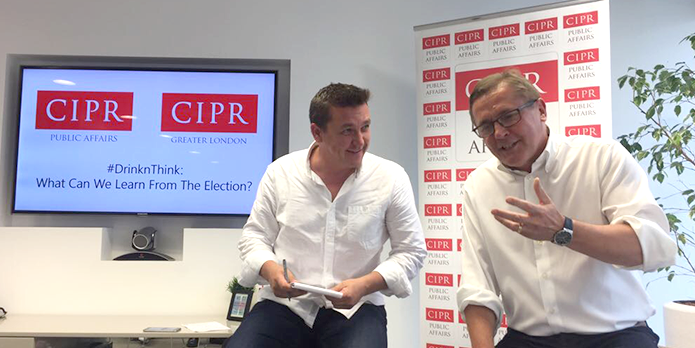
Labour and its resurgence: Five takeaways
The 2017 general election will be remembered as one of the most extraordinary elections in modern times. In the preceding months, the mood seemed, to borrow an overused political buzzword, stable.
The Conservative Party was regularly polling at least 15 points ahead of Jeremy Corbyn’s Labour. How much influence could a mere seven-week campaign really have on voters? Theresa May must have thought ‘not enough to close that gap’ when deciding to call the election.
At a CIPR Greater London event in July 2017, Steve Howell, deputy director of strategy and communications for the Labour Party, and Freshwater’s very own former chief executive, gave the inside track as to how Jeremy Corbyn and the Labour team successfully fought back. Account Manager, Stephen Hall, shares his top five takeaways from Steve’s talk.
Positivity is infectious
Until May 2017, most people will have known Jeremy Corbyn through negative press headlines, ranging from his ‘rebellious past’ through to stories of plots against him from within his own party.
The Conservative’s adopted scathing attack-style ads that sought to amplify what they felt to be the general consensus about Corbyn. This backfired, however, and ultimately exposed them to criticism for not concentrating on their own policies and promises, cementing an increasingly held view, especially among young voters, that the Conservatives lacked any kind of positive or hopeful message.
Election reporting rules meant the broadcast media had to give Corbyn equal weight with the Prime Minister. Proportionality would allow people to see more of him and perhaps dispel some of the myths and rumours surrounding his character.
Tip: When the narrative of the print press is predominately against you, seek other opportunities and other channels less hostile to your message.
When time is tight, go with your gut
During the campaign there were moments of national crisis. The Manchester attacks, followed by atrocities in London, saw campaigning suspended. Rather than avoid the issue of national security, which had always been portrayed as a weakness for Corbyn, the team decided rather to tackle the issue head on, feeling that not to do so would be disrespectful to those communities affected.
Despite concerns about addressing such an emotive issue so openly, the team went with what felt right. On May 26th, only days after armed forces had taken to the streets following the attack in Manchester, Corbyn pitched Labour as the safer choice for the country. Cuts to the police from the then Home Secretary, Theresa May, left her in an awkward position.
Tip: Risk management needn’t always come at the cost of doing what you feel is morally right – a balance can, and should, be struck.
Build on your strengths
Corbyn is a lifelong campaigner but the campaign could not simply be a re-run of the two Labour leadership contests: instead, it had to have the gravitas appropriate to the election of a government. That meant set-piece speeches to outline his views in more depth as well as the rallies and campaign appearances that were his trademark. He proved a much better all-round General Election campaigner than the Tories had expected.
Tip: Never underestimate your opponent and take anything for granted.
A consistent narrative
Slogans are important, but can often be vacuous. Labour ensured that “For the many, not the few” was a summary of its collective narrative, rather than something the party couldn’t legitimately quantify with policy or opinions.
Subtle changes to messaging were important. Labour decided to use “held back” – rather than “left behind” – to explain that everyone had been hit by austerity, not only those in Brexit-voting constituencies. When subsequently tested in polling, “held back” had struck a chord.
Tip: Focus groups and polls offer invaluable opportunities to test and refine your message with the people you want to engage. Find the time to test messages wherever you can!
The power of social
Labour invested heavily in social media – devoting time to creatively-crafted organic posts. Alongside this, donations poured in, allowing money to be spent on online advertising. Labour increased its following and reach exponentially, while the Tories lagged behind. With a growing surge of support and a contagious sense of solidarity, young people turned up to the polls in the highest numbers since 1992.
Tip: On its own, social media may not have won Labour the election, but it certainly illustrated how young people should not be ignored.
Freshwater delivers public affairs and strategic communications consultancy services across private, public and not-for-profit sectors.
